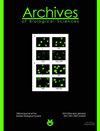Intraocular injection of KH902 alleviates retinal hypoxia in a mouse model of oxygen-induced retinopathy
IF 0.8
4区 生物学
Q4 BIOLOGY
引用次数: 0
Abstract
Inhibition of vascular endothelial growth factor (VEGF) has been widely applied in antineovascularization therapies. As a novel anti-VEGF agent, KH902 (conbercept) is designed to restrain pathological angiogenesis. However, the effects of KH902 on retinal hypoxia have not been well studied. In a mouse model of oxygen-induced retinopathy (OIR), we assessed retinal hypoxia at postnatal days 14 (P14) and P17, as well as retinal neovascularization (RNV) at P17. In addition, we evaluated the protein level of VEGF and galectin-1 (Gal-1). Changes of the neuroretinal structure were also examined. Our results indicated that KH902 could remit retinal hypoxia in OIR at P14 and P17, which was an exciting novel finding for KH902 function. Additionally, we confirmed that KH902 markedly reduces RNV. Our results indicated that administration of KH902 downregulated VEGF expression, as well as Gal-1. Damage of neuroretinal structure after KH902 injection was not observed, which was also an encouraging result. Our study suggests that KH902 plays a role in alleviating retinal hypoxia and that it could be used for the treatment of other neovascular ocular diseases.眼内注射KH902可减轻氧致视网膜病变小鼠视网膜缺氧
抑制血管内皮生长因子(VEGF)已广泛应用于抗血管化治疗。作为一种新型的抗vegf药物,KH902(概念)被设计用于抑制病理性血管生成。然而,KH902对视网膜缺氧的影响尚未得到很好的研究。在氧致视网膜病变(OIR)小鼠模型中,我们评估了出生后第14天(P14)和第17天的视网膜缺氧,以及第17天的视网膜新生血管(RNV)。此外,我们还评估了VEGF和半凝集素-1 (Gal-1)的蛋白水平。观察神经视网膜结构的变化。我们的研究结果表明,KH902可以缓解P14和P17的视网膜缺氧,这是关于KH902功能的一个令人兴奋的新发现。此外,我们证实KH902显著降低RNV。我们的结果表明,给药KH902下调VEGF和Gal-1的表达。注射KH902后未观察到神经视网膜结构的损伤,这也是一个令人鼓舞的结果。我们的研究提示,KH902具有缓解视网膜缺氧的作用,并可用于治疗其他新生血管性眼部疾病。
本文章由计算机程序翻译,如有差异,请以英文原文为准。
求助全文
约1分钟内获得全文
求助全文
来源期刊
CiteScore
1.40
自引率
0.00%
发文量
25
审稿时长
3-8 weeks
期刊介绍:
The Archives of Biological Sciences is a multidisciplinary journal that covers original research in a wide range of subjects in life science, including biology, ecology, human biology and biomedical research.
The Archives of Biological Sciences features articles in genetics, botany and zoology (including higher and lower terrestrial and aquatic plants and animals, prokaryote biology, algology, mycology, entomology, etc.); biological systematics; evolution; biochemistry, molecular and cell biology, including all aspects of normal cell functioning, from embryonic to differentiated tissues and in different pathological states; physiology, including chronobiology, thermal biology, cryobiology; radiobiology; neurobiology; immunology, including human immunology; human biology, including the biological basis of specific human pathologies and disease management.

 求助内容:
求助内容: 应助结果提醒方式:
应助结果提醒方式:


